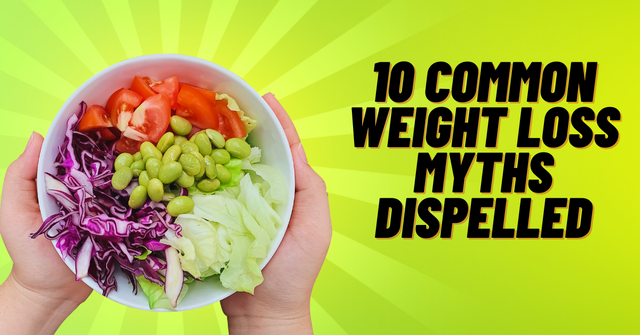10 Common Weight Loss Myths Dispelled

Introduction
There are many myths and misconceptions around the subject of weight loss. These beliefs frequently cause confusion and make it difficult for people to make informed decisions about their weight loss journey. In order to assist you distinguish fact from fiction, we shall dispel ten popular weight reduction myths in this post and offer evidence-based advice.
Myth No. 1: Spot Reduction
One common misconception is that you may use exercise or specialized activities to target fat loss in particular body parts. Sadly, there is no solid scientific data to back up spot reduction. Your body burns calories from a variety of sources, including fat storage, while you exercise. However, depending on each individual's genetic make-up and unique body composition, the first areas of fat loss may differ from person to person.
Myth #2: Carbohydrates are the enemy
When it comes to shedding pounds, carbohydrates frequently have a poor rap. The fallacy contends that reducing carb intake is essential for weight loss. However, carbohydrates are a vital source of energy for our bodies. The secret is to choose carbohydrates that are high in fiber and minerals, such whole grains, fruits, and vegetables. Refined and processed carbs, such as white bread and sugary snacks, should be kept to a minimum.
Myth 3: Missing Meals Causes Weight Loss
Some people think that skipping meals is a good method to reduce calories and encourage weight loss. This is not, however, the case. Skipping meals can really work against you and undermine your attempts to lose weight. Your body's metabolism slows down when you miss meals, which might cause you to feel overly hungry and overeat later. Regular, well-balanced meals are crucial to maintaining a healthy metabolism.
Myth 4: Low-Fat or Fat-Free Diets are the Best for Losing Weight
It's a common misconception that following a low-fat or fat-free diet will help you lose weight. But it's critical to realize that not all fats are created equal. The creation of hormones, satiety, and the absorption of nutrients all depend on healthy fats like those in avocados, almonds, and olive oil. The unhealthy fats, such as trans fats and excessive saturated fats, should be avoided in the diet.
Myth 5: Dietary supplements for weight loss are miraculous cures
Weight loss supplements frequently make the claim of effortless and speedy weight loss, but they rarely live up to it. While certain supplements may have minor impacts on appetite or metabolism, they are not a miracle cure. Only a balanced diet, consistent exercise, and good lifestyle choices can result in sustainable weight loss. Always prioritize feeding your body whole foods rather than relying on supplements.
Myth 6: Eating after 6 o'clock results in weight gain
It's a popular myth that eating after 6 o'clock causes weight gain. Instead of the time of meals, the total number of calories ingested throughout the day determines weight growth. It's crucial to pay attention to your body's hunger and satiety signals and only consume food when you are actually hungry. Instead of the precise time of day, what matters most is the type and amount of food you consume.
Myth #7: All Calories Are Created Equal
It's a common misconception that all calories are created equal when it comes to weight loss. However, this oversimplification ignores the significance of dietary density as well as the effects of various macronutrients on metabolism and satiety. While it is true that a calorie deficit is required for weight loss, focusing on full, nutrient-dense foods can give the body the vitamins, minerals, and fiber it needs while encouraging satiety.
Myth 8: A slow metabolism prevents you from losing weight.
Many individuals think that it's impossible to lose weight if you have a slow metabolism. Individual metabolic rates can vary, but there are a number of other factors that can affect metabolism as well, some of which are modifiable. Regular exercise, including strength training, can assist improve muscle mass, which in turn speeds up metabolism. A healthy diet and continuous physical activity can also benefit metabolism.
Myth 9: Losing weight requires only willpower
The process of losing weight is far more complicated than that and is frequently viewed as requiring willpower and self-control. The control of weight is affected by genetic factors, hormonal disorders, and environmental factors. Willpower is necessary, but it's also critical to treat the underlying issues that could cause weight gain. Long-term success can be achieved by adopting a holistic strategy that addresses both the physical and psychological components of weight loss.
Myth 10: After you lose weight, you're done
Although losing weight is a huge accomplishment, the journey is far from over. Another widespread misconception is the idea that you can resume your former behaviors once you've lost weight. But keeping a healthy weight involves a lifelong dedication to a balanced diet, consistent exercise, and self-care. Instead of concentrating exclusively on the number on the scale, it's critical to adopt a healthy lifestyle that promotes your complete wellbeing.
Conclusion
Myths about weight reduction can be confusing and slow down the process of achieving a healthier weight. You may make wise judgments and position yourself for success by dispelling these widespread misconceptions and concentrating on facts backed by evidence. Keep in mind that a mix of good food, regular exercise, and a balanced lifestyle will result in sustainable weight loss. You can reach your weight loss objectives and enhance your general wellbeing by adhering to these rules.